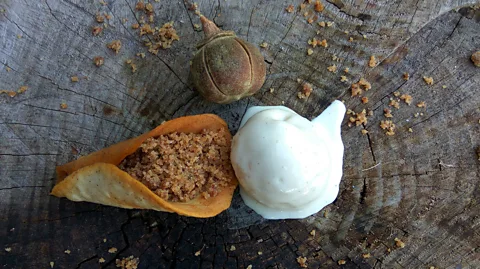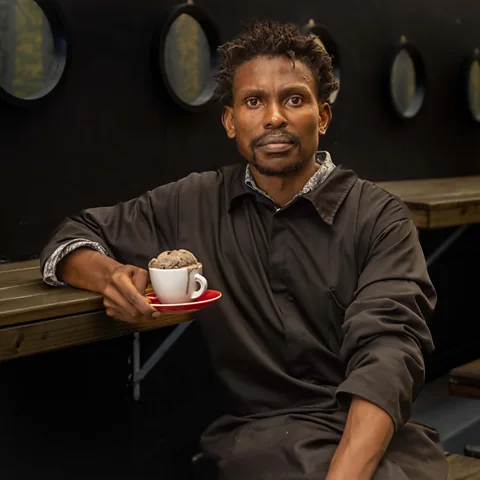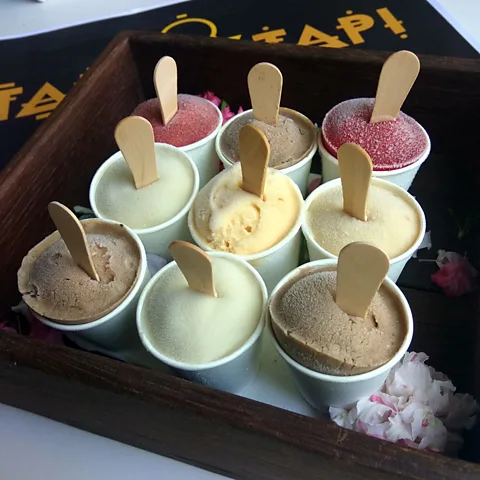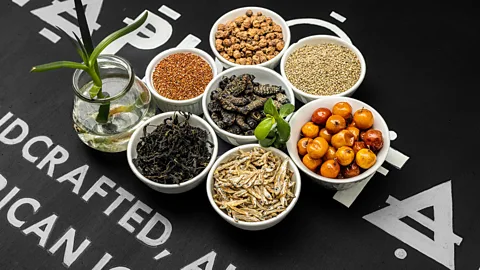Africa's ice cream cafe that nurtures self-esteem
 Tapi Tapi
Tapi TapiTapi Tapi makes ice cream with a deep mission: to soothe the collective souls of African people by sharing folk traditions, rituals and cultures through food.
Located in Cape Town's artistic centre of Observatory, Lower Main Road offers a fascinating array of thrift stores, cafes and restaurants best explored on foot. Among them is an unassuming ice cream cafe called Tapi Tapi (a Bantu ideophone [nyaudzosingwi] that means "sweet sweet") whose calligraphy-clad, alley-style entrance serves as an invitation to simply pay attention.
That's because Tapi Tapi is no ordinary ice cream cafe. With a firm focus on rehabilitating the collective self-esteem of African people by sharing folk traditions, rituals and cultures through food practices, all its ice creams are handmade in small batches with ingredients typically communally sourced from the gardens of friends and patrons.
Over the course of each month, you may find a curated menu of ice cream flavours that includes amagwinya (a deep-fried dough from South Africa), kelewele (an ensemble of caramelised plantain, ginger and fire-roasted peanut from Ghana), and nhopi (a roasted pumpkin and dark chocolate pairing common in Zimbabwe). In the next month, the menu might feature flavours like thiakry (a millet couscous and sour milk pairing from West Africa), mbwire mbwire (roasted sorghum biscuits from Zimbabwe), and mowa, an amaranth greens and yellow plum vegan dish that is enjoyed across the continent. No flavours are ever repeated.
Founder Tapiwa Guzha says that Tapi Tapi started as a "self-imposed dare" that was largely inspired by childhood memories of lingering in his grandmother's kitchen whenever desserts were being prepared. Born and raised in Zimbabwe, Guzha moved to South Africa in 2005 to study at the University of Cape Town and went on to earn his PhD in molecular biology in 2014. The following year, he began his postdoctoral fellowship in Stellenbosch, a wine oasis in South Africa's Western Cape province, where he recalls seeing a trilingual sign for the first time. "The default is Afrikaans and English for building signs, room names and that kind of thing," he says, "but the first time I saw a third language was Xhosa [a Bantu language], and it was a 'trespassers will be prosecuted' sign."
 Jo Munnik
Jo MunnikThis sparked an internal dialogue in which Guzha began to process the realities of being a black person in South Africa, where despite more than 80% of the population being black, the minority white population still holds the majority of all economic power. This led to increasingly nuanced explorations of different worldviews, which prize Western knowledge systems and food cultures over those of Indigenous people, and simultaneously, interrogations into the parallels between African cosmology and Western science.
"I remember thinking about the difference between a rainmaker [a spiritual intermediary in various African traditions who requests rain through ritual] and a meteorologist. I don't necessarily believe in the ability to conjure up rain from nowhere, but I do believe in the ability to understand weather patterns and using that knowledge to drive a narrative in whatever context – but one system is not as valued as the other one," he says.
World's Table
BBC.com's World's Table "smashes the kitchen ceiling" by changing the way the world thinks about food, through the past, present and future.
Guzha remembers traveling from Cape Town to Stellenbosch and witnessing the lush vineyard and cascading mountain landscapes of the Cape Winelands, and the contrasting, painful realities of the wine labourers working on the farms. Simultaneously, he was finding himself feeling increasingly disillusioned by the academy and sensibilities of modern science. He found that the cities he was visiting for his postdoctoral research were repeatedly pointing him away from science and more toward the abundance of Indigenous agriculture and knowledge systems.
Following his grandmother's funeral in 2018, Guzha returned to Cape Town, having decided to leave academia and instead do something in food. He had been making ice cream at home for eight years, and charged himself with a mission to turn his skills into a potential business. At first, he experimented with fermented and alcohol-infused ice cream, but then he came across snacks from his home country of Zimbabwe at a local restaurant and decided to try adding them to ice cream. The snacks included maputi (popped maize), Mazoe orange crush (an orange cordial, sometimes also used in cocktails and fruit punches), baobab (a large pulpy fruit with a citrus-like flavour), small and tangy masau fruit, and nyii, a sweet berry that can be eaten fresh, dried or candied. "It was the first time I ate ice cream that really connected with who I am. It was nostalgic and made me think of happy times. I connected with it beyond its delicious flavour."
 Tapi Tapi
Tapi TapiGuzha officially opened Tapi Tapi as a direct-delivery service in 2018 and has since gone on to ground his continental storytelling through ice cream into a brick-and-mortar cafe. The walls are adorned with Kasvikiro art, a self-taught Afro calligraphy inspired by his keen interest in alphabet systems and handwriting. A reminder also hangs on the entrance wall: "This is your home, the land of your people. Nourish yourself from it and tend to it so that others may enjoy it too. Remember, our lives, stories and histories don't begin in 1488 [when the first European rounded the southern tip of Africa]. You come from a time and place most ancient. We have been here from the very beginning."
Since then, Guzha has gone on to collaborate with poets, conservationists, yogis and professors across a range of disciplines to host a range of educational experiences, including tasting menus and foraging hikes.
Zandile Finxa, South African chef, consumer scientist, recipe developer and founder of The Sorghum Agenda digital campaign, explained how a visit to Tapi Tapi prompted a series of conversations about their different approaches to food.
More like this:
• A West African ode to a spicy and tangy chicken dish
• The ancient lore of the humble Nigerian yam
• Jollof Wars: Who does West Africa's iconic rice dish best?
"I started talking to Guzha about cultural sociology, Indigenous foods and sustainability, and for me, he encompassed all of that," they say.
For Finxa, engaging with Guzha allowed them to explore the academic side of Indigenous foods and customs drawing on Guzha's scientific background, while also learning from Guzha's cultural exchanges during his travels. Guzha and Finxa's conversations culminated in a collaboration in which Finxa developed a sorghum brownie that Guzha paired with his sorghum blondies ice cream.
 Jo Munnik
Jo MunnikMany of the ingredients and ice cream flavours found at Tapi Tapi may not be readily recognisable to people outside Africa. However, this is the idea behind every scoop: to celebrate flavours that are, as Guzha says, "familiar, nostalgic, local and seasonal, homegrown, common and representative" of African people without any impositions based on legacies from elsewhere.
"We are not the 'black version of [insert European inspired name here]'," says Guzha. "There's a lot of that going around. We don't use 'African sage' in our gelato, we use imphepho. So when you see a name you don't recognise in our flavours, Google it and get to know it for what it is and not for what it approximately represents in your food vocabulary."
For those who cannot get to Tapi Tapi for the ice cream, Guzha offers a range of recipes using ingredients that can be found in the pantries of many African homes, including cookies coated in maize, millet or teff, celebrating grains that would not ordinarily be used to make sweet treats. He serves the cookies with the ice cream.
For Guzha, with a little curiosity and willingness to play and experiment, we can take what have long been simple staples and turn them into delicious desserts. "There's a lot of magic around us all the time, pay attention and often the land provides. Don't wait on agriculture to feed you when there's bounty abound," he says.
--
If you liked this story, sign up for The Essential List newsletter – a handpicked selection of features, videos and can't-miss news, delivered to your inbox twice a week.
